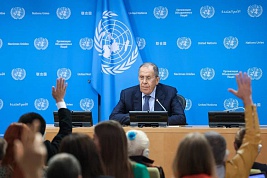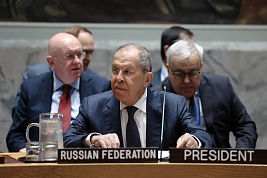Foreign Minister Sergey Lavrov’s statement and answers to media questions at a joint news conference following talks with Indian Foreign Minister Subrahmanyam Jaishankar, Moscow, July 9, 2021
Ladies and gentlemen,
We had a good discussion covering the entire bilateral agenda plus international and regional affairs. We reaffirmed that strong and diversified ties between our countries rely on a solid foundation of mutual trust and enjoy strong immunity against the international political environment.
We share the opinion that despite the challenges brought on by the coronavirus infection, our dialogue has been making progress over the past year. We talked online, but a number of meetings also took place in person, including my visit to India this spring. Now, Indian Foreign Minister Jaishankar has come to Moscow on a regular visit.
We fully agree that Russian-Indian relations, which our leaders have described as a particularly favoured strategic partnership, are strengthening and have a bright future. We paid special attention to promoting the political dialogue and preparing the content for the upcoming Russian-Indian summit this year. Our respective heads of state will determine the specific date depending on coronavirus related developments.
Much has been accomplished in fighting the COVID-19 pandemic. The Russian Direct Investment Fund has signed agreements with leading Indian pharmaceutical companies to produce the Russian vaccine. Pilot production has already been tested. Now, the relevant agencies are coordinating ways to organise commercial production. I’m confident that production of the Russian vaccine in India will come as a significant contribution to global efforts to combat this virus.
We also discussed ways to coordinate our actions given that people need to go places and visit other countries. We have some ideas in this regard, which our Indian friends have come up with. We will work on them in practice.
We exchanged views on trade and economic cooperation. This subject was at the top of the agenda during yesterday’s meeting between Foreign Minister Jaishankar and Deputy Prime Minister Yury Borisov. Together, they head the Intergovernmental Commission on Trade and Economic Cooperation. We look forward to the intergovernmental commission’s existing mechanisms developing additional measures to stimulate trade, economic and investment cooperation. It is a good sign that in the first four months of this year, our trade has grown by almost 12 percent. These dynamics must be promoted in every possible way.
We reaffirmed the need to sign an updated investment protection agreement before agreeing on a programme of trade, economic and investment cooperation to 2030 and completing our work on a number of other documents that can actually help our cooperation break new ground.
We are interested in seeing talks between India and the Eurasian Economic Commission on forming a free trade area start as soon as possible. A corresponding working group has been formed. We hope that the date of its first meeting will be determined soon.
As you may recall, an event that is seminal to our cooperation took place in the area of the peaceful use of nuclear energy on June 29: the pouring of the first concrete at Unit 5 of the Kudankulam NPP. This is yet another example of the successful implementation of our joint plans in a key area of Russian-Indian partnership.
Defence cooperation is an important part of our relations. We exchanged information on progress in implementing current defence cooperation contracts and on the work to expand the corresponding legal framework. We reiterated our willingness to participate in projects to localise the production of Russian defence products and to create joint ventures in India as part of implementing import substitution programmes titled “Make in India” and “Self-Sufficient India” announced by our Indian colleagues. We are confident that building up efforts in this area fully meets our countries’ national interests and regional security concerns.
We noted progress in our interaction in the peaceful exploration of outer space, primarily as part of the support by the Roscosmos State Corporation of the Indian manned mission Gaganyaan.
We expressed similar or overlapping approaches to key issues of our time and pressing regional matters, including the political settlement of a very complicated situation in Afghanistan, the situation in Syria and regarding the Iranian nuclear programme as well as other topics. We highly appreciate the quality and the scope of the close cooperation between Moscow and New Delhi, including at the UN, where India is currently a member of the Security Council, as well as within the G20, the SCO and BRICS. Further contacts within the RIC format also look promising. We are planning to hold another meeting at the ministerial level soon. We had an in-depth discussion of the processes unfolding in the Asia-Pacific Region. Both sides strongly reiterated their position in favour of maintaining and strengthening the central role of ASEAN in the security architecture that has taken shape there over the past decade, including the East Asia Summit, the ASEAN Regional Forum on security, meetings of ASEAN defence ministers and partners and other formats.
We are grateful to our Indian colleagues for their constructive approach and willingness to continue close coordination of actions in the international arena. The talks were very successful. I wish to thank my colleague and turn the floor over to him.
Question: Today, representatives of the Taliban announced in Moscow that they control 85 percent of the territory of Afghanistan, including a number of checkpoints on the border with Iran. What additional measures can Russia and Tajikistan take to strengthen the border, especially since two-thirds of it is controlled by the Taliban? Can the world resign itself to the fact that Afghanistan is again under control of the Taliban without any agreement with the Kabul government?
Sergey Lavrov: This question should be addressed to the Afghans. With the mediation of the United States, steps were outlined to normalise the situation, to initiate a political process, and to reach agreements on a transition period and then on the final variables of what Afghanistan would be like in the future. Clearly, only the Afghans themselves can resolve these matters. But the agreements reached between Washington and the Taliban were welcomed by everyone. We want them to be implemented.
With regard to ongoing hostilities in Afghanistan in the absence of a political process, we are concerned about this because these problems can spill over into the territories of our allies.
The Taliban has occupied border posts on the Iran and Tajikistan borders. As long as this is happening in Afghanistan, we do not plan to take any action other than reiterate our insistent calls for starting the political process, which all Afghans have supported verbally, as soon as possible.
We will discuss Afghanistan in Dushanbe next week, where an SCO ministerial meeting will take place. A meeting in the format of the SCO − Afghanistan Contact Group will also take place there. We will hear what our Afghan friends have to say about their plans to advance the political process.
Next week, in Tashkent, there will be an international conference “Central and South Asia. Regional Interconnectivity: Challenges and Opportunities” where Afghanistan will certainly be at the top of the agenda. We hope that the participants of both events will send a clear message to all Afghans about the need to start talking in earnest.
Question (retranslated from English): How do you assess Russian-Indian relations in the context of combating the coronavirus infection? The media has started using a new term – vaccine diplomacy. What are the prospects for cooperation in this area between our countries?
Sergey Lavrov: I believe that in this area, too, Russia and India’s combined efforts to combat the coronavirus infection are exemplary. We are committed to protecting our people and participating in global efforts to ensure the widest possible vaccination rates, including for developing countries that cannot do it themselves. We were guided by these approaches during the recently held forums, including the discussion of this topic at a G20 meeting.
We are cooperating to establish the production of the Sputnik V vaccine in India. A small batch of doses has already been produced as part of a pilot programme. Now the specialists are fine-tuning the processes to ensure impeccable quality.
We are willing to discuss the possibility of coordinating our actions with regard to vaccinated people, issuing certificates to the ones that have been vaccinated. I think we can agree on that. It will serve as an example for other countries, which, within the framework of what you called “vaccine diplomacy,” are trying to discriminate against certain vaccines, in particular, Russian and Chinese vaccines. These ideas are coming from certain EU countries, although the European Commission itself is interested in cooperating with Russia and other manufacturers of key global vaccines.
Let’s not forget that in addition to the G20, which also discusses this topic, we are looking into the possibility of working through the SCO, BRICS and other associations that Russia and India are members of.
To reiterate, India and Russia oppose attempts to politicise this situation and to be guided by considerations of unfair competition. I’m confident that most countries share this approach.
Question: You mentioned the talks on a free trade area between the EAEU and India. What do you think about their progress? Do you have an idea of when an agreement might be signed?
Sergey Lavrov: It is clear when the talks will start. A working group has been created. The members will agree on the first meeting as soon as the coronavirus situation allows. Obviously, it is uncomfortable to conduct such talks online. Personal meetings are necessary. We, and our Indian friends, are interested in making this process as quick as possible and in reaching an agreement.
In the context of these talks, we will take into account the fact that mutual settlements play an important role in the EAEU (both within this integration association and in relations with free trade agreement partners), considering the problems in the world markets today and attempts to introduce sanctions related to the use of the dollar. We are discussing the issues of transaction settlements in national currencies in our trade within the EAEU and with our other partners.
I would like to mention in this context that our Indian colleagues have an opportunity for a good start. In 2018, the Russian National Payment Card System and the National Payments Corporation of India (NPCI) signed a memorandum on cooperation on using each other’s potential in this area. I believe this will make our talks on reaching an agreement on a free trade area and facilitating its subsequent operations much easier.


